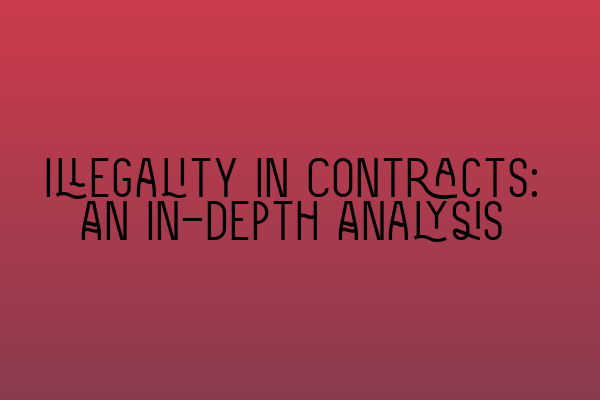Illegality in Contracts: An In-depth Analysis
Welcome to our blog post on illegality in contracts. In this article, we will provide you with a comprehensive analysis of the concept of illegality in contracts, its significance, and its implications in the legal landscape. Understanding this topic is crucial for both solicitors and individuals entering into contractual agreements.
What is Illegality in Contracts?
Illegality in contracts refers to situations where a contract is deemed unenforceable or illegal due to the nature of the agreement or its purpose. This means that if a contract is found to involve illegal activities, it may not be upheld by a court of law.
It is important to note that not all contracts are inherently illegal. However, certain terms or the overall purpose of a contract may render it illegal and unenforceable. This is because the law seeks to discourage and prevent participation in illegal activities through contractual agreements.
Types of Illegality
Illegality in contracts can manifest itself in various forms. Here are some common types of illegality:
- Illegal Purpose: A contract may be deemed illegal if its purpose violates statutory or common law.
- Illegal Consideration: If the consideration involved in a contract is illegal, the entire contract may be rendered unenforceable. Consideration refers to the exchange of something of value between the parties involved.
- Illegality by Operation of Law: Some contracts may become illegal due to changes in legislation or regulations that render the agreement unlawful.
- Public Policy Considerations: Contracts that contravene public policy, such as agreements that promote fraudulent or antisocial behavior, may be considered illegal.
Effect of Illegality
When a contract is found to be illegal, it is considered void and unenforceable. This means that the parties cannot seek legal remedies or enforce the terms of the agreement through the court system.
However, it is important to recognize that each case involving illegality in contracts is unique and may be subject to the interpretation of the court. Courts will consider various factors, such as the degree of illegality, the seriousness of the illegal conduct, and public policy considerations, in determining the outcome of a case.
Real-Life Case Studies
To provide you with a better understanding of how illegality in contracts plays out in real life, we have compiled some interesting case studies. These case studies offer insights into legal practices and decision-making when it comes to illegality in contracts.
Visit this article for an in-depth exploration of Unveiling Real-Life Case Studies: Insights into Legal Practice and Decision-Making.
Implications for Solicitors
For solicitors, understanding the concept of illegality in contracts is vital to ensure that their clients’ agreements are lawful and enforceable. Solicitors must have a comprehensive knowledge of contract law, staying up-to-date with changes in legislation and regulations to provide accurate legal advice.
Additionally, solicitors can advise their clients on structuring contracts in a way that avoids illegality, ensuring that all terms and purposes comply with the law. By doing so, solicitors can help their clients avoid costly legal disputes and protect their interests.
If you’re interested in learning about solicitor salaries in the UK, Exploring Solicitor Salaries in the UK: Average Earnings and Factors Affecting Income is a valuable resource.
Conclusion
In conclusion, illegality in contracts is a crucial aspect of contract law that should not be overlooked. Understanding the different types of illegality and their implications can help both solicitors and individuals navigate the complexities of contractual agreements.
For more information on mastering client relationship management skills to enhance trust and loyalty, visit this article: Mastering Client Relationship Management: Skills for Solicitors to Enhance Trust and Loyalty.
For guidance on pursuing a law school education in the UK and choosing the right path for your future, check out: Pursuing a Law School Education in the UK: Choosing the Right Path for Your Future.
If you’re interested in securing training contracts and embarking on the journey to becoming a solicitor, our article on Securing Training Contracts: A Roadmap to Becoming a Solicitor provides a comprehensive roadmap.
Thank you for reading our in-depth analysis of illegality in contracts. We hope this article has provided you with valuable insights into this complex area of law.
